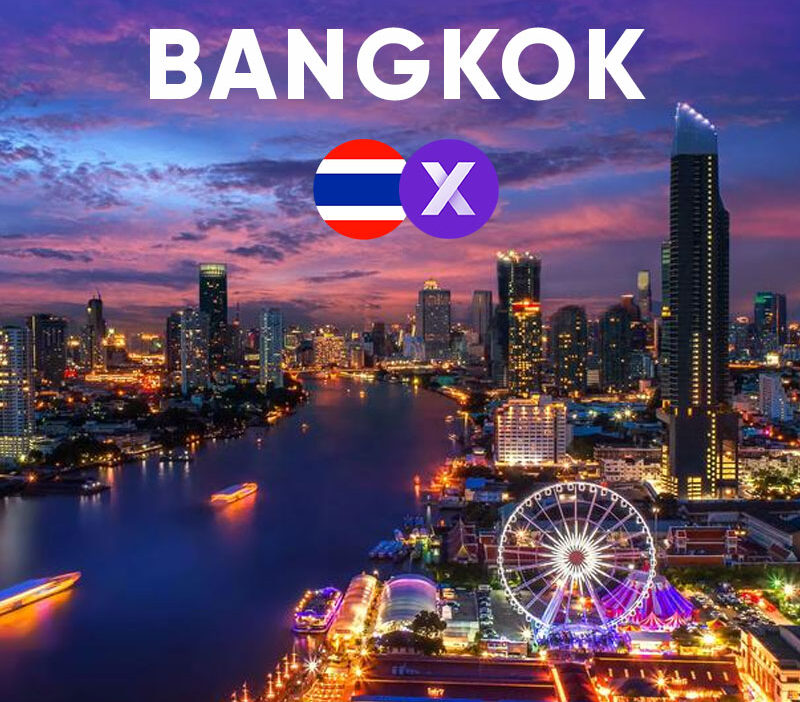Moving to Bangkok can feel like stepping into another universe — but with a bit of planning, it’s surprisingly easy to settle in.
Bangkok doesn’t ease you in — it throws you into the deep end. Neon signs, temple bells, food carts, 40°C heat, and ultra-fast internet — all within a single block. It’s chaotic, yes, but also one of the most exciting and livable megacities in Asia, especially if you know how to navigate it.
Key Facts About Bangkok (Thailand)
| Parameter | Value |
|---|---|
| Population | ~10.7 million (city), ~15 million with metro area |
| Language | Thai (main), English widely used in business/tourism |
| Currency | Thai Baht (THB) |
| Average Rent | ฿10,000–25,000/month (~$270–700 USD) |
| Average Local Salary | ฿25,000–40,000 (~$700–1,100 USD) |
| Digital Nomad Budget | $1,200–3,000/month |
| Health Insurance | Private (~$40–100/month) |
| Safety Level | Very safe, especially in central areas |
| Public Transport | BTS Skytrain, MRT, buses, Grab, moto-taxis |
| Climate | Tropical – hot all year, rainy season May–Oct |
| Residence Permit / Long Stay | Business, education, family, Elite Visa |
| Education | International schools & universities (Chulalongkorn, MUIC) |
| Grocery Prices | Very affordable – markets and supermarkets |
| Access to Nature | Parks, rivers, weekend escapes to beaches or mountains |
| City Atmosphere | Fast-paced, modern, vibrant, with endless options for living & leisure |
Renting in Bangkok: Modern, Affordable, and Amenity-Packed
Bangkok’s rental market is fast-moving, expat-friendly, and surprisingly luxurious for the price. Condos often include pools, gyms, and security. You’ll find everything from minimalist studios to skyline-view penthouses.
Average monthly rent in 2025:
- Studio in On Nut or Ari: $300–500 USD
- 1-bedroom near BTS (e.g., Thong Lo, Asok): $500–900 USD
- 2-bedroom modern condo: $900–1,500 USD
- Utilities: $50–100 USD/month
- Internet: ~$20 USD/month
- Deposit: 1–2 months
Want to explore real listings? Browse long-term rentals in Bangkok on XMetr.
Visas and Residency: Flexible, but You’ll Need to Plan
Thailand doesn’t offer permanent residency easily, but it’s great for long stays:
- Tourist visa (TR) – up to 60 days + extension
- Education visa (ED) – for Thai language or study
- Retirement visa (O-A) – for 50+ with income/savings
- Work visa (Non-B) – requires employer sponsorship
- LTR (Long-Term Resident) visa – for high-earning expats, remote workers, or investors
- Elite visa – 5–20 years of residence with upfront payment (~$15,000+ USD)
Visa runs are less common now due to stricter enforcement, so planning ahead is key.
Language and Local Life
Most locals speak basic English in the city center — but knowing a few Thai phrases goes a long way. English signage is common in public transport and malls.
Culturally, Bangkok is a blend of hyper-modern convenience and deep-rooted traditions. One moment you’re in a skyscraper mall, the next — making an offering at a spirit house under a banyan tree.
Where to Live in Bangkok
- Thong Lo / Ekkamai – trendy, Japanese expat scene, upscale condos
- Ari – leafy, creative, popular with remote workers
- On Nut – affordable, well-connected, rising expat zone
- Silom / Sathorn – business district, high-rises and nightlife
- Phrom Phong / Asok – central, walkable, near BTS and MRT
- Bang Na – suburban, larger homes, international schools
Proximity to BTS (Skytrain) or MRT (subway) is key for stress-free living.
Top 5 Best Neighborhoods in Bangkok for Long-Term Living
| Neighborhood | Why It’s Great |
|---|---|
| 1. Sukhumvit | Expats’ favorite – walkable, full of amenities, near BTS stations. |
| 2. Ari | Hip, green, laid-back yet trendy, great cafés and community feel. |
| 3. Sathorn/Silom | Business district with great apartments and city views. |
| 4. Phrom Phong | Upscale, family-friendly, near parks and luxury malls. |
| 5. Lat Phrao | More affordable, with shopping centers and strong transit links. |
Cost of Living in Bangkok
Bangkok is more expensive than Chiang Mai but still an incredible value compared to Western cities.
- Rent: $500–1,200/month
- Utilities: $80–120/month (with air conditioning)
- Groceries: $200–300/month
- Transport: $1 per BTS ride or $30 monthly pass
- Coffee: $2–3
- Dinner for two: $25–40
- Coworking: $80–150/month
- Health insurance: $40–100/month
A comfortable lifestyle starts around $1,500–2,500/month.
Work and Income
Most foreigners in Bangkok are:
- Remote workers or digital nomads
- English teachers or international school staff
- Corporate professionals or NGO employees
- Creative freelancers and entrepreneurs
There’s a large coworking and startup ecosystem, and good connectivity (fiber internet and 5G) is standard.
| Profession | Avg. Gross Salary per Month (EUR) |
|---|---|
| Software Developer (local) | €1,300 |
| IT Project Manager (local) | €1,600 |
| UX/UI Designer | €1,100 |
| Architect | €1,000 |
| Mechanical Engineer | €1,200 |
| General Practitioner (Doctor) | €2,000 |
| Nurse | €800 |
| High School Teacher | €900 |
| Marketing Specialist | €1,100 |
| Accountant | €1,000 |
Healthcare: Excellent and Affordable
Bangkok is a medical tourism hub, with high-end hospitals and English-speaking staff.
- Doctor visit: $15–30 USD
- Specialist: $40–70 USD
- Dental cleaning: ~$30 USD
- Emergency care: $100–300 USD
- Private insurance: ~$50–120/month
Popular private hospitals include Bumrungrad, Samitivej, and Bangkok Hospital.
Final Thoughts: Is Bangkok Right for You?
Bangkok is loud, intense, and always changing — but if you embrace the pace, it gives back tenfold. There’s nowhere else where you can eat street food for $1, take a luxury gym class, and get rooftop cocktails before sunset.
If you want affordability without giving up comfort, and chaos with a hidden rhythm — Bangkok might just be your next home.
Also check out our article on Moving to Melbourne
